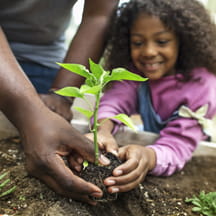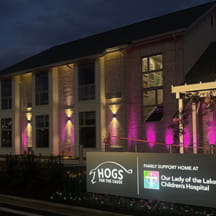The Onondaga are one of the five original nations of the Haudenosaunee (Iroquois) Confederacy that have populated Upstate New York since before the colonization of the Americas.
Like most Indigenous peoples, their history with Western society, and, by extension, its institutions, has largely been one of exploitation. As a result, building trust with the Onondaga Nation requires a long-term effort that goes beyond meetings and contracts.
“Collaborating with us means understanding that we’re a sovereign nation with distinct protocols and procedures,” said Simone Gonyea, a member of the Onondaga Snipe clan and senior health project coordinator in the Department of Pediatrics’ Division of Developmental and Behavioral Pediatrics at the University of Rochester. “To work with us, you need to actively engage with all facets of the community.”
Gonyea helps coordinate a project between the Onondaga Nation and Golisano Children’s Hospital (GCH) at the University of Rochester Medical Center aimed at reducing barriers and increasing access to developmental behavioral pediatrics (DBP) care for Indigenous children and families.
The project, which started in 2023, is led by Christina Mulé, PhD, associate professor in the Division of Developmental and Behavioral Pediatrics at the med center.
Data from the National Survey of Children with Special Health Care Needs demonstrates that Indigenous children have the highest prevalence of special health care needs: 17% compared to 14% among non-Hispanic white children.
Gonyea, a former principal of the Onondaga Nation School with 22 years of classroom experience, has seen growing concern among the community.
“This project is an opportunity to take a closer look at things that teachers and families were observing in their students,” she said.
“A number of children in the community have suspected developmental challenges, but due to stigma and difficulty accessing care, these children haven’t been identified and often do not receive the intervention services we would recommend they have,” echoed Mulé.
In the DBP field, resources are often stretched, even in affluent areas.
The Onondaga Nation, like other Indigenous communities, faces inequitable access to care due to factors such as underfunding from Indian Health Services, lack of transportation in rural areas, and cultural differences that complicate bridging the divides between health systems and Indigenous populations.
Mulé became aware of these issues after reconnecting with an Onondaga community member she’d known as a child.
Thanks to seed money from the University Centers for Excellence Developmental Disabilities’ (UCEDD) DBP Division, she was able to partner with the Onondaga Nation School and begin school-based support.
Mulé’s pilot work led to a $1 million grant from the New York State Council on Developmental Disabilities, which will help her extend DBP services across the medical and school sectors.
“I’m very interested in addressing health disparities and service inequities within developmental pediatrics,” Mulé said. “There’s a national shortage of specialists in our field, and waitlists are long even for families who know how to navigate the system. But what about the families who don’t know how?”
Establishing connection
Mulé’s personal background uniquely positions her to build the necessary trust within the Onondaga community.
As a mixed-race, second-generation Korean American who grew up in LaFayette, New York, near the Onondaga border, she formed friendships with many kids in the Indigenous community early on, finding kinship in a predominantly white environment.
“I spent a lot of time on the ‘rez’ as a youth playing softball and cheering on the boys at lacrosse games,” she said. “Those friendships were meaningful and helped me feel secure in my own racial identity.”
According to Gonyea, Mulé’s personal experiences have been key in establishing the foundation for the project.
“She understands the community, having been connected as a youth. She supports us, inquires naturally, and knows when to pause — because she respects the culture,” Gonyea explained.
The project includes promoting developmental health, increasing developmental screenings, and improving access to developmental evaluation and intervention. This involves building capacity at the Onondaga Nation School and within the broader community.
Patience is essential. Urgency often dominates the DBP world, but the Onondaga Nation has experienced a long history of marginalization, from broken treaties to land appropriation and racial discrimination.
“A lot of this work is about developing allyships and friendships to break through the historical mistrust of Western institutions,” Mulé said. “You have to make a personal connection — and understand that reciprocity is fundamental to working successfully with Indigenous people.”
Mulé has made a genuine effort to establish these connections and has been humble enough to admit when there have been cultural missteps along the way.
To help guide the work and build a partnership that is respectful of the Nation’s sovereignty, she and Gonyea have made concerted efforts to connect with Nation leadership and to gain approval for the project from the Longhouse. The Longhouse comprises nine clans, each led by a Clan Mother.
Equally important, Mulé has immersed herself in the community, joining social activities on the Nation, including participating in a women’s book club, learning cultural practices such as making corn soup, and becoming a regular at the Firekeepers Diner, a social hub of the community.
“Some of those social connections lead to doing the work, but mostly it’s about people getting to know me, which eventually fosters trust. It’s not just about sharing what I do professionally, but sharing about who I am as a person,” Mulé said.
“We’ve had previous projects with the University of Rochester Medical Center, but they were more academic in nature,” said Gonyea. “This is a much deeper effort that Christina is engaging in.”
Now in the second year of the five-year university grant, Gonyea and Mulé are fully engaged in all aspects of the grant objectives, which include:
- Engagement in bidirectional knowledge-sharing that improves partnership between GCH and the Onondaga Nation
- Workforce training and technical assistance to educators serving Indigenous children with developmental disabilities — enhancing the ability for children to remain in their community school, which is rich in culture and language
- Developmental promotion through community education initiatives
- Access to timely developmental and behavioral pediatrics screening, evaluation, and intervention
“We’re currently building a support network and raising awareness,” said Gonyea. “We want to reach a point where a family member or teacher with questions knows exactly where to go for help.”
As the project continues to progress, Mulé hopes this connection can help sustain the project beyond the grant, leading to long-term infrastructure that will enable the next generation of Onondaga children to thrive.
“The goal is to serve as allies and advocates for the community and bring needed developmental services to the Nation that are respectful of their cultural heritage and sovereignty,” she said.


